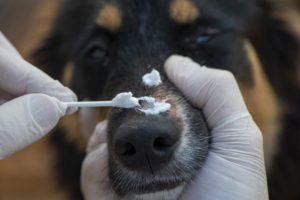Ringworm in Dogs: Symptoms and Causes
Ringworm is a nasty zoonotic infection that can affect your dog, other pets, and your family. You must follow your vet’s advice about treating your pup for ringworm.
Ringworm in dogs can be caused by direct contact or contact with contaminated items. Your pup may have been playing around in the dirt, which can lead to infection if spores live in the soil. Ringworm causes a patchy circular area that may be red and inflamed.
Treating your dog for ringworm involves thoroughly cleaning your house to control or prevent the spread of infection. If you want to know more about ringworm in dogs, this informative article can help.

What is Ringworm?
Many various ailments can affect your dog throughout their lifetime, and it is common for dogs to become contaminated with a parasite.
Many people think ringworm is an actual worm, but that is not the case. Ringworm is a fungal infection that is referred to as dermatophytosis. It is a circular-shaped lesion that is commonly characterized by an area of hair loss. It is generally raised, itchy and inflamed.
There are quite a few species of ringworm in dogs:
- Trichophyton mentagrophytes
- Microsporum gypseum
- Microsporum canis
Even though ringworm is more common in cats, it can also be present in dogs. It is a highly contagious and persistent zoonotic illness.
What Causes Ringworm in Dogs?
Ringworm transmission results from direct contact with the fungus, but there is a bit more to it. Not every dog who comes in contact with ringworm fungus is infected, as there needs to be a perfect storm. There are several possible causes of ringworm in dogs:
- Some dogs have weaker immune systems, as they are called “asymptomatic carriers.” These dogs can pass on the contamination to other pets or people
- Spores can live in the environment, and dogs can contract ringworm from digging around or playing in the dirt.
- Contact with contaminated items, such as grooming tools, food or water bowls, furniture, and dog beds, and sharing toys
- Dogs that have skin conditions can contract ringworm through an open wound, fresh scratch, fleas, or chronic skin condition
- Direct connection with the fungus on an animal or individual
The spores of fungi that cause ringworm can exist in the environment for at least eighteen months. Lesions on the skin will typically occur about one to three weeks following exposure. Dogs can contract ringworm from being at a shelter or kennel long-term.
What Are the Indications of Ringworm in Dogs?

Ringworm is not life-threatening, but your pup will need the assistance of your veterinarian to help them with the problem and prevent the spread of the infection. There are a wide array of symptoms of ringworm in dogs:
- Patchy or circular areas of hair loss or alopecia
- Darkened or red skin
- Dandruff or flakes
- Broken hairs on the coat
- Inflammation around the ring
- Hair regrowth inside the circular crusty patch
- Raised circular regions
- Rough or brittle nails
The pup’s skin may or not be itchy. The claw folds and nails may also become infected, resulting in deformed nails.
What is the Treatment of Ringworm in Dogs?
Ringworm is a very treatable condition, but you must treat it aggressively, which your vet will help you with. Ringworm has a reputation for being incredibly tenacious, and you must work with your vet to not only treat your pup but also prevent the spread of the infection to other pets or people. The following includes the treatment protocol for treating ringworm in dogs:
Quarantine
Ringworm is a zoonotic infection, and you must confine your dog to a separate part of the home. Keep your pup away from the other home pets and family members. Try to place them in a room like a large bathroom that is easy to clean or another secluded area of the house.
A room with rugs or wood floors should be avoided, as it is very challenging to keep clean. Ringworm spores can remain in the environment from anywhere between six to eighteen months, and infected pets typically remain contagious for about three weeks if aggressive treatment is pursued.
Topical Treatments

You can use topical creams and ointments to help treat the infection. The veterinarian will tell you how long and often they should be applied. Your vet may also instruct you to shave or cut off hair to make for a more straightforward application of ointments or creams. However, shaving pups with long hair is not recommended, as it can cause tiny injuries to the skin, which can perpetuate the infection, causing fungus to spread more into the skin.
It is also important to bathe your pup and ensure they are as clean as possible. Bathing will help prevent further contamination between pets because the hairs will not leave an infection when shed. Medicated antifungal shampoo is essential for treatment. The shampoo should be left on your dog for about five minutes before rinsing.
Oral Treatments
Oral medications can help to clear the infection by rendering the ringworm unable to reproduce and spread. You should use oral medications and topical treatments together. Your vet will probably want you to administer medications to your dog for at least six weeks. Oral treatment for ringworm can include the use of different antifungal drugs.
Clean The Environment in Which You Live
The infection can remain in the environment for a long time, and ringworm is a highly contagious disease. Your vet will likely advise that you decontaminate the environment you live in to help clear out the existing infection to stop its spread. The spores of fungi will develop and enter the hair shafts of your pup.
Your dog sheds their hair daily, which means that their hair will naturally fall off and contaminate the environment. If you intend to remain one step ahead of the infection, you will need to vacuum your home thoroughly. It could seem like a minor point, but you should also disinfect your vacuum afterward.
Washing the pup’s bedding in hot water and drying it will significantly help reduce the infection’s spread. Clean any area your dog has come in contact with using a dilute bleach solution. Bleach will not get the job done, so you must clean first with an item like liquid dish soap, then disinfect after.
The area of the house in which you quarantine your dog should also be carefully and thoroughly cleaned. The entire house should be disinfected and cleaned to be safe. Remember to wear disposable gloves when taking care of your infected pooch.
Additionally, you need to wash your hands and clothing once you have finished treating your pup, and wear gloves when applying ointments or creams on their body. Dealing with ringworm can be difficult and tedious, but it is necessary to take these steps to protect your pup and prevent everyone else from becoming infected.
Conclusion
Ringworm is typically spread through direct contact with the fungus. There are many symptoms your dog may experience when they have ringworm. If you approach treatment aggressively, your pup may only be contagious for about three weeks. You must follow your veterinarian’s instructions regarding ringworm in your dog.
Do you have further questions regarding ringworm and your pup? Main Street Veterinary Center in Bartow, FL is here to help. Give us a call at (863) 534-9584 or make an appointment online today.
Are you looking for a veterinary career? Our team at Ascend Vets is hiring! Visit our careers page to learn more about veterinary career openings.
Recent Posts
About Us
Family is family, whether it has two legs or four. At Main Street Veterinary Center, we've spent the last 40 years healing and caring for your pets. As a family-operated practice, we know that family is about more than simply being related. Animals give us the ability to develop strong bonds and feel great compassion for a fellow living creature.
